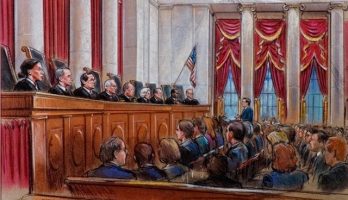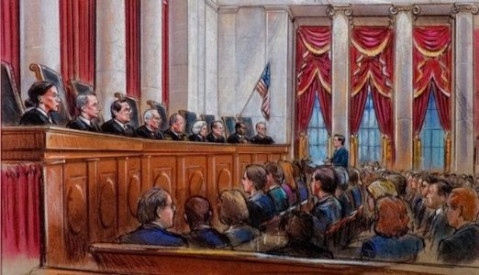Widgetized Section
Go to Admin » Appearance » Widgets » and move Gabfire Widget: Social into that MastheadOverlay zone
When Email and Phone Records Can Make an Evidence Trail
The views expressed are those of the author and do not necessarily reflect the views of ASPA as an organization.
By Jason Bowns
June 1, 2018

Image Credit: 123RF Limited
During a criminal investigation related to drug trafficking, federal investigators sought access to records from a particular Microsoft email account.
The Stored Communications Act of 1986 (SCA) compels electronic service providers to provide user records but doesn’t explain the geographic scope.
The warrant request was framed as a “hybrid” between a search warrant and a subpoena, as it directed Microsoft employees to provide the requested information. Some information was located on servers in Ireland, thousands of miles away, and Microsoft asserted that the SCA simply didn’t apply to material stored abroad.
Judge Preska from the Southern District of New York agreed with the U.S. Department of Justice, threatening Microsoft with a contempt finding for its stubborn noncompliance. After legal wrangling, the tide shifted in July 2016.
That’s when Justice Susan Carney, writing for the Second Circuit Court of Appeals, asserted “We believe Microsoft has the better of the argument…Neither explicitly or implicitly does the statute envision the application of its warrant provisions overseas.” That conclusion in Microsoft v. United States springs directly from two recent Supreme Court of the United States (SCOTUS) cases reflecting judicial restraint and general deference towards legislative intent.
In 2007, Microsoft Corp. v. AT&T Corp. expressly held that “United States law governs domestically but does not rule the world.” The 2010 case, Morrison v. National Australia Bank, Ltd. concluded, “When a statute gives no clear indication of extraterritorial application, it has none.” SCOTUS accepted Microsoft’s appeal and heard oral arguments in February 2018. Congress didn’t wait for its decision.
Senator Orin Hatch took the lead in shepherding a SCA reform bill throughout the lawmaking process, and President Trump signed the Clarifying Lawful Overseas Use of Data (CLOUD) Act into law on March 23, 2018.

Photo Credit: Deseret Digital Media
Among many changes is an express provision that electronic communication providers shall comply with requests “regardless of whether such communication, record, or other information is located within or outside of the United States.”
Less than a month later, SCOTUS completely vacated the Second Circuit decision as moot and remanded that case back to the trial court. Microsoft then received a new CLOUD Act warrant in lieu of that older SCA request it opposed.
Congress created an unambiguous, extraterritorial mandate for providers. The CLOUD Act gives law enforcement agencies what SCA language had lacked.
Now, another SCA case still sits in the criminal justice wings, awaiting its fate. Congress did not revisit the central question posed by Carpenter v. United States.
That is, “Does the warrantless search and seizure of cell phone records, which include the locations and movements of users, violate the Fourth Amendment?”
Armed robbers targeted Radio Shack and T-Mobile stores in Ohio and Michigan in December 2010. They entered businesses, threatening customers and employees. Then, these thieves grabbed smartphones before darting into a getaway car.
One admitted participant told investigators names of others involved and their alleged phone numbers. Unlike the Microsoft case, which involved emails, here investigators sought electronic service provider records containing call histories and location data on users’ cellular phones going back several months.
Those records identified other conspirators. Later, a jury convicted Timothy Carpenter of six counts under the federal Hobbs Act for which he received 1,395 consecutive months of imprisonment. Another party to the case, Timothy Sanders, was sentenced to 170 months. The cellular location data was part of the evidence trail used to help place them near phone robbery crime scenes.
Both men contended that cell-site location information (CSLI) crosses the line and infringes upon Fourth Amendment rights which would require “probable cause.”
Requests for a judicial order compelling production under the SCA must include “specific and articulable facts showing that there are reasonable grounds to believe that the contents…are relevant and material to an ongoing criminal investigation.” This is a lower burden of proof than probable cause.
Affirming the district court decision, Judge Kethledge from the Sixth Circuit Court of Appeals held that the defendants “elide,” in weighing “the distinction between the content of a communication and the information necessary to convey it.”
Concurring, Judge Stranch opined about the judiciary’s role to define the Fourth Amendment’s scope. She added, “The runaway pace of technological development makes this task more difficult. But the job is ours nonetheless and the circumstances before us lead me to believe that we have more work to do…”
SCOTUS accepted Carpenter v. United States for certiorari and heard oral arguments on November 29, 2017. The court’s final decision is pending.

Image Credit: Sports Handle
Both Microsoft and Carpenter show how courts must adapt settled jurisprudence to a modern world. The rule of law instills hope that ideals will withstand dramatic shifts which technology—and time—shall always bring. Five months before he died, President Kennedy prophetically announced how “Change is the law of life.”
As even the worst crises of today metamorphose into tomorrow’s distant memory, we may still find that some precepts stay the same. Indeed, G.K. Chesterton wrote over a century ago, “The most sacred thing is to be able to shut your own door.”
Author: Reared in rural Connecticut, Jason Bowns earned a Bachelor of Arts degree from New York University, majoring in Classical Civilization and Hellenic Studies while minoring in Politics and Social Studies Education. He earned his Master of Public Administration degree at John Jay College of Criminal Justice, honing essential skills to detect organizational fraud, waste, and abuse. He’s reachable at [email protected].







Follow Us!